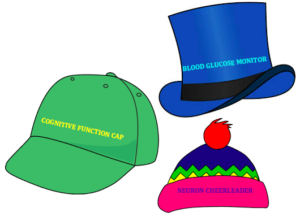Today instead of talking about food, I’m going to talk about something closely related to food consumption – insulin!
This summer, I am conducting research as part of a summer undergraduate research program at NYU. The lab I am working in studies Parkinson’s disease, particularly relationships between different hormones and neurotransmitters in Parkinson’s disease, and recently they have been focusing on the interaction of insulin and dopamine. While I may discuss what our lab has found so far, and what I’m doing, specifically, in a later post, for now I plan to discuss some interesting things I have found through literature research for my project. In particular, I have learned a lot recently about the many roles insulin plays in the body and in disease – not only in conditions like diabetes, but also in neurodegenerative diseases like Alzheimer’s and Parkinson’s.

Loss of dopamine, as many of you may know, is a major factor in Parkinson’s disease. Other hormones and neurotransmitters, are also known to have altered levels in Parkinson’s disease patients, and some are thought to have roles in regulating dopamine release. Insulin, for example, has been found to enhance release of dopamine.
Insulin obviously plays a significant role in metabolism and blood sugar regulation, indicating to cells that they should uptake glucose from the blood. However, evidence increasingly demonstrates insulin as also playing significant roles in the brain, regulating such processes as neuronal survival, synapse formation, and cognition.
For some time it has been shown that patients with Type II diabetes have an increased risk of developing Parkinson’s disease. Interestingly, recent studies have found insulin resistance in Parkinson’s disease patients’ brains – even in those patients without diabetes. Such studies suggest that common pathological mechanisms and cellular pathways may underlie both diseases, and further, indicate that drugs currently used to treat Type II diabetes could represent potential novel treatments for Parkinson’s disease.
In addition to Parkinson’s, however, studies have also found links between Alzheimer’s disease and insulin resistance, with some even beginning to call Alzheimer’s “Type III Diabetes.” While it may be a little premature to go quite that far, I think it’s pretty fascinating to think about. It also makes a basic degree of sense: less-than-healthy American diets cause oxidative stress (build-up of free radicals) and lead to insulin resistance, and oxidative stress is also a major factor in most neurodegenerative diseases. So there’s a little nugget of extra motivation for us all to maintain a healthy diet and lifestyle!
Anyways, I certainly do not claim to be an expert on any of these topics, but I hope I piqued your interest a bit! If you’d like to learn more, I attached a few articles, divided into “Very Science-y” and “More Easily Digestible,” below.
Happy Monday!
Very Science-y Articles:
Insulin resistance and Parkinson’s disease: A new target for disease modification?
Shared dysregulated pathways lead to Parkinson’s disease and diabetes
More Easily Digestible Articles:
We may finally be able to slow Parkinson’s, with a diabetes drug
Many overweight Parkinson’s patients have insulin resistance
I recently finished the autobiography of Dr. Thomas E. Starzl, the man who pioneered liver transplant surgery helped find drugs to fight rejection of transplanted organs among other things. One of his insights was that venous blood from the portal vein coming from the pancreas to the liver is richer in insulin that other blood in other veins making its way back to the heart. And if the liver is deprived of the blood supply from the portal vein, the liver will shrivel and gradually die. The liver has to have that insulin rich blood to thrive and be healthy. He said it took a long time to convince medical colleagues of this fact for the assumption was that all venous blood was the same.
Interesting. I’ll have to look at that, and what exact role insulin plays in that case. That sounds like a cool book, too!
I always appreciate the extra motivation to eat healthily, but I especially appreciate it today because I need to make a trip to the grocery store, lol. Good choices only!